2nd Part
ANCIENT JEWELLERY EXHIBITED IN ANATOLIAN CIVILIZATIONS MUSEUM
Head Jewellery
Earrings
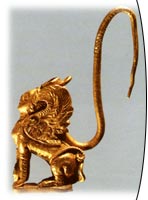
| Name: | Earring |
Type: | Gold |
Location where it came from: | Not known |
Way of Coming: | Not known |
Dimensions:: | H: 2.1cm W:1.7cm |
Period: | The 4th century BC |
Its hook is very high, bent downwards and has a sharp point. The hook is soldered to the back of a sphinx standing on a rectangulat base. The sphinx stands on its back feet the head is slightly up towards the back. His chest is puffed up and straight and two front legs are taut. The hair is separated in the middle and goes down to the chest on both sides. The wings rise backward and upward and then turn towards the head and end there. The wings are a bit highre than the head. The tail is adhered on the right rump. A slot in the form of almond is mounted on the head, between the ends of the wings and the stonefrom this slot has fallen. There is a slot of the same type between the front legs of the sphinx. A ring is added to the slot in the upper side. The parts: the tail, the hook, the head and the wings are separately made by hammering and mounted with solder. While the long, "S" shaped hook should be a ring and should be attached to the ring on the head of the sphinx in its original form, it is brought to "S" shape later and connected to the back of the sphinx with solder and its original form has been lost.
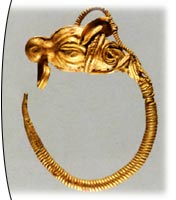
| Name: | Earring |
Type: | Gold |
Location where it came from: | Kütahya |
Way of Coming: | Purchase |
Dimensions:: | H: 2.8cm W:2.1cm |
Weight: | 2.6 gr. |
Period: | The 3rd century BC |
It is made by winding another golden wire on a thin golden wire. One end of the ring, which is broken, is sharp. The other end is tied to the neck of an animal similar to an antelope or a gazelle. The neck is made by rounding a flat golden sheet and is wound on an internal meld. The head is formed by soldering small parts to each other, which are made with a hammering technique. The ears are cut from a sheet and the horns are shown with grooved filigree. The internal side of the body is empty and it is made with a hammering technique.
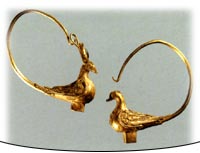
| Name: | Earrings |
Type: | Altın |
Location where it came from: | Not known |
Way of Coming: | Confiscation |
Dimensions:: | H: 3.6-3.4cm W.:2.7-2.9cm. |
Weight: | 3.8 gr. |
Period: | The 3rd century BC |
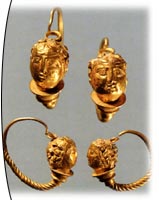
| Name: | Earrings |
Type: | Gold |
Location where it came from: | not known |
Way of Coming: | Purchase |
Dimensions:: | H: 2.3-2.7cm W:2.6-3.0cm |
Weight: | 9.05 gr. |
Period: | The 2nd century BC |
It is a twisted ring, which becomes thin and flat towards the end, the orther ends finish with a woman head. The neck of the woman is placed on a base that is formed by profiled rings that become wider upwards. Her hair is in the form of small curls. The eyes are big and bulging, a nose is flat and squat and a mouth is significant. The inside of the head is empty; the earring is closed by inserting a hook in the handle at the rear side. The internal mould is discharged from the hole opened on the backside of the head that is made by using an internal mould.
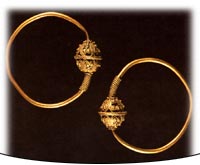
| Name: | Earrings |
Type: | Gold |
Location where it came from: | Ordu, Ünye, Denizbükü |
Way of Coming: | Confiscation |
Dimensions:: | D: 4.85 cm |
Weight: | 26 gr |
Period: | The 4th century BC |
The ends of a simple, big ring are closed by going inside a ball ornamented with filigree and granule. The ball is divided in the middle with a thin, golden wire. A thin golden wire is wound at the place where the ball combines with the ring on one side.
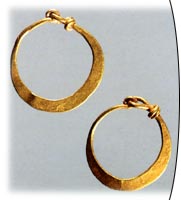
| Name: | Earrings |
Type: | Gold |
Location where it came from: | Nizip, Gaziantep |
Way of Coming: | Purchase |
Dimensions:: | D: 1.5cm |
Weight: | 0.87 gr. |
Period: | The 2nd century AD |
It is cut from a golden sheet in a form of a crescent thinning towards the ends. One end is made in a way that a ring is being bends around itself and the other end is passed through this ring and closed